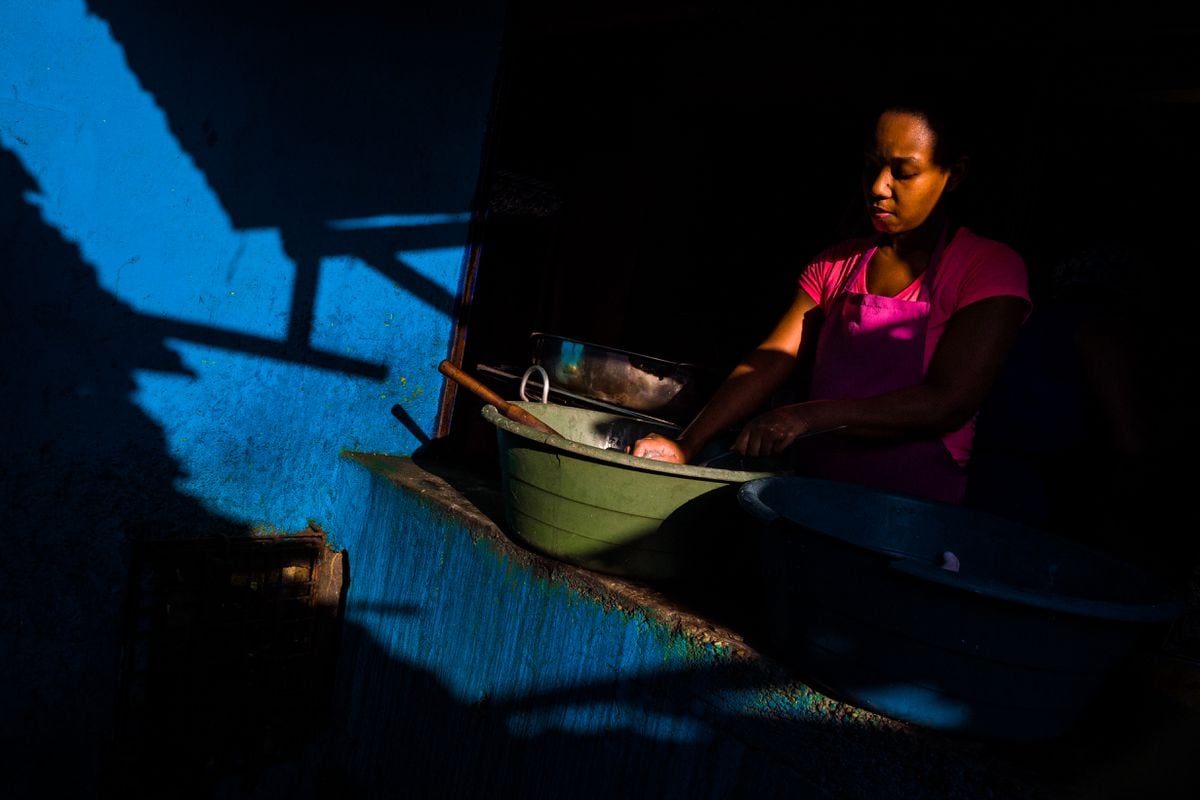Ilse Salas (Mexico City, 40 years old) does not dodge any questions and gets into more than one garden.
The Mexican actress premieres this Sunday a new series,
Señorita 89
, a dramatic thriller that can be seen on the Starzplay platform, about beauty pageants in Mexico and the politics that moves them.
Salas plays the director of the contest, Concepción, a dark woman willing to go to the ultimate consequences to get what she wants.
Violence, drugs, prostitution and a political scandal buried under sequins, makeup and spotlights are combined in this story written and directed by Lucía Puenzo (
La Jauría
).
The series co-stars actresses Ximena Romo, Natasha Dupeyron, Bárbara López, Coty Camacho and Leidi Gutiérrez.
Trained in theater, Ilse Salas has carved out a career in film and television with increasingly interesting and complex roles.
This interpretive evolution of hers led her to win the Ariel Award for Best Actress in 2018 for
Las Niñas Bien
, directed by Alejandra Márquez Abella, and to be nominated in 2015 for her role in
Güeros
, by Alonso Ruizpalacios.
Her last movie
Plaza Catedral
,
by Abner Benaim, was the first Panamanian film shortlisted for Best Foreign Film for the Oscars.
The actress has very expressive deep green eyes that stand out in her natural elegance.
Her beauty is neat, with a hint of imperfection that she has become her personal hallmark.
When she speaks, she moves her hands.
As if she part of the words that she was going to say, she had them at the tips of her fingers.
She wears a masculine white striped linen suit and wooden clogs.
Quite the opposite of what she would wear that particular Medea that represents her last character.
QUESTION.
Concepción is a powerful woman who uses the women in her beauty pageant for her own ends, what was it like preparing this character?
ANSWER.
It was about investigating the women of the time.
I was inspired by women I've met throughout my life who go with this ultra-feminine look: long hair, jewelry... but in reality they are hyper-masculinized in all their actions.
A woman who had power in the eighties, nineties, usually exercised it in a patriarchal way because she didn't know any other.
To date it is very common to see rich and powerful women being very masculine in that sense.
I believe that she is a macho woman insofar as she exercises her power with violence, with manipulation and underestimating those who she has in command of her.
Q.
Would you say that
Miss 89 talks about the
different forms of violence against women?
R.
Yes, among other issues such as the political management of a country, such as sisterhood, friendship and the contradictions in which we fall as women and as people.
How to get a position or a place of power, we flank our scruples.
P.
At this time when there is more and more talk of feminism in the country.
Do you think beauty pageants are doomed to die out?
R.
I want to think so and I am surprised that they have not already done so, because I cannot understand, under any justification, that they continue to exist.
P.
It seems that the last attempt has been to disguise them as feminism and talk about them from the perspective of women's empowerment and diversity, as in the last Miss Universe...
A.
There is no way one thing can be joined with another.
They are putting women to compete and they are judging their physical appearance.
There is nothing of that that coexists with feminism.
They asked me if I didn't think that these contests bring something good to the country.
I do not think so.
I'm sure it brings economic stability to the woman who wins it, but I don't think it brings anything to the country.
Rather, turning women into a product has served the men of power to endorse their political plans or management.
Now, it is important for me to mention that as much as I rant about beauty pageants that seem obsolete, archaic and violent to me, my perception
of the women who participate in them changed after doing
Miss 89 .
Q.
In what sense?
R.
Because he judged the participants as frivolous, hollow or as women with an economic ambition that objectifies them.
And I understood that for many it is an escape route to another reality that is usually harsh and hostile.
Just as they are exploited in a beauty contest, they have perhaps been exploited in their environment.
And that totally changes my perception about the women who participate in them.
Therefore, I continue to judge pageants, but not the women who participate in them.
Q.
What was one of the scenes that most impacted you?
R.
The one of the first parade of them in their underwear, measuring their legs, their boobs... That scene affects me a lot because I see it today in the same way, perhaps now it is the social networks that judge, but we are still products.
In other words, a woman's body is used to sell things.
It is modified or the need to modify is instilled and we are not taught to love our defects and love our bodies as they are.
We are taught to consume things that modify them.
P.
Has that happened to you in the world of cinema?
R.
Yes. But they have been revelations that have come with age and with becoming aware of many things.
I never noticed the privileges of my skin color, for example.
I never felt particularly privileged until I heard testimonials from other women who have been rejected or underestimated because of the color of their skin.
And violence and abuse... of course you can see it in our industry, but we are in a system where so many things are normalized, which is not easy either.
He did give me the vibes and gave me a better position, but he didn't rape me either, right?
You assume it as the perks of the trade.
All of these are very deep patriarchal wounds that we normalize... That's why 'Ya es hora' was created, a Mexican women's movement in the film industry.
Q.
And how does that make you feel?
R.
Well, there is a feeling of guilt for not having listened, not having seen, not having done anything.
He opens your eyes and ears to not allow that to happen again.
P.
I am struck by your latest characters because they have a depth and brutal transformation.
Concepción (Miss 89, 2021), Sofía (The Good Girls, 2018) Alicia (Plaza Catedral, 2021), why did she choose these roles?
R.
I would not say what luck is because I look for it.
I look for jobs like this at the cost of rejecting many others that do not imply personal meaning.
P.
What do these women have of Ilse Salas?
R.
I guess I'm very dramatic, I don't know (jokes).
I like to give depth to characters who ask for it.
Alicia is a mother grieving her son, Sofía falls from the pedestal that was her kingdom and Concepción has a lot of Medea, a woman who realizes the betrayal of her gender when the damage is already done, of which she is part of the problem and that she is a traitor.
But since she is not a psychopath, she hurts, affects and transforms her.
Q.
How do you get to be such a versatile actress?
She has gone through the theater, she enters comedy, tragedy...
R.
I take my career very seriously, but not myself.
Making the series
100 days to fall in love
is a clear example.
At first I was very hesitant to take it and in the end I said, why am I going around so much?
I want to live on the beach for six months [it was recorded in Miami] and I want to die laughing with Erick Elías and Mariana Treviño.
I don't care if that lowers my status, prestige... And in the end, it was fantastic.
People met me who didn't even know me.
Q.
I cannot go through this interview without talking about
Plaza Catedral
and the death of your partner in the film, Fernando de Casta, a street child who played himself.
How was it working with him?
R.
It was a unique experience.
As we say in Mexico, a pound chickpea, a lost gem.
With Fernando I had an immediate click.
I had not come across anyone so luminous and complex because their reality was very harsh.
I will always remember him as a brilliant child, very intelligent, very funny, very talented, very impatient, difficult to stop.
As happens to all children in such vulnerable situations who are forced to live without time for anything and nobody gives it to them because there are no conditions.
Q.
What do the awards you have received throughout your career mean?
R.
First it is a compliment that is impossible not to appreciate.
People in your community, colleagues in your industry, endorsing your work, celebrating you.
It feels super nice, it's very stimulating.
Q.
Which director or director would you like to work with?
R.
That he has not worked yet, with Lucrecia Martel.
It's my dream.
But I can't tell you because then you're going to be disappointed.
I have to be discreet and hope that one day he will see my work and maybe look at me.
And that he has already worked, with Alonso Ruiz Palacios.
P.
That has it easier, right?
He is the father of his children.
R.
What?
(laughs) Have you seen another movie I've made with him?
I already told you that
Museum
doesn't count.
I say protagonist.
I've already told you in every possible way.
I hope one day it will happen because he is by far my favorite director.
P.
And how is the house of an actress and a filmmaker?
R.
Very boring, ha ha ha.
Q.
I find it hard to believe.
R.
Well, there is too much cinema in the house, too much theater.
As much as we want our children to do other things, to be interested in other things, sometimes it is unavoidable.
His games always revolve around fiction, directing and making music for his videos, movies and costumes.
I mean, they don't ask for toys, they ask for costumes.
I apologize in advance, as Luis Pescetti says: “I am depositing my children in the eternal fund of psychoanalysis”, ha ha ha.
P.
It may be difficult for them to have a computer child...
R.
I have the hope that scientists will come out because their grandparents are doctors, but it is not happening.
I can't dissuade them if that's what they want, when they see that we have so much fun in our vocations.
Something that Alonso and I have is a very deep vocation, we really like what we do.
Q.
In what situation would you say the Mexican film industry is currently?
R.
The Mexican film industry is very powerful and it seems a shame that it is not made to grow more.
I think it has to do with the governments in turn, without wanting to rant about the current one, because it is what it is and we are there for many reasons, but it has so many possibilities to grow, so much international prestige that I feel that it lacks more stimuli.
Cinema is identity and it is a job that generates peace, that generates empathy, where hundreds of families work... I feel frustrated because our governments do not make it grow as it could.
P.
Do you think that you can fight against violence from the cinema?
A.
Totally.
Yes Yes Yes Yes.
That is, and from the culture.
We tell stories that generate catharsis in people.
I have been transformed by things I saw in a movie.
Anything that makes you think and rethink things can be very powerful.
P.
What is your opinion precisely of the weight that culture has in the current government of Mexico?
R.
It hurts me that it is considered a luxury, a privilege when it is a right.
If our governments saw it as a human right, I think we would have a lot in our favor, but it is seen as a luxury and I think that is the main mistake.
P.
What does cinema lack at this time after the pandemic: more aid, more distribution, more projection?
A.
Currently our future depends on
streamers
.
If you want to make a movie and get the necessary millions, you have to ally yourself with these platforms that are going to limit your freedom because they are going to produce things that work for them to get subscribers.
Stimuli from your government, from other investors that allow you to have more freedom are missed.
The auteur cinema ““”” is missed.
Q.
Isn't making films for platforms selling your soul to the devil?
R.
I am not an author, but it has cost Alonso 10 times more to make his next film because he has not wanted to sell his soul to the devil.
We are in a difficult moment.
Either you make your movie with the millions of these platforms, but you give them the final cut or you probably won't make it, or you make it with a fifth [of the budget].
P.
Would you like to go to the other side of the camera and direct at some point?
R.
Well, look, I'm already a little behind in a series that we have together with Alejandra Márquez, Casandra Ciangherotti and Johanna Murillo, part of the cast of
The Good Girls
.
It is tentatively called 'La libertad', although there is still no date to start recording.
P.
It sounds in line with this women's movement that we were talking about before...
R.
Yes, well, it's like our monotheme now, really.
I never get tired of this discussion.
As a feminist woman I have many doubts and many contradictions.
And the series goes that way, we want to talk about it with a lot of humor.
subscribe here
to the
newsletter
of EL PAÍS México and receive all the informative keys of the current affairs of this country


/cloudfront-eu-central-1.images.arcpublishing.com/prisa/PFCASL26NJGBTAP7F55QP67V3I.jpg)






